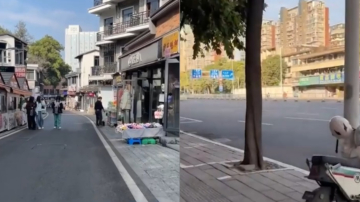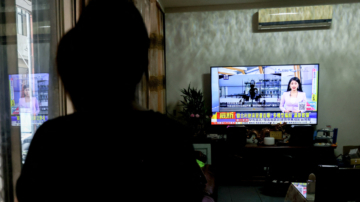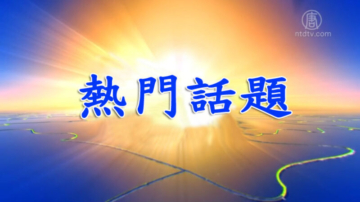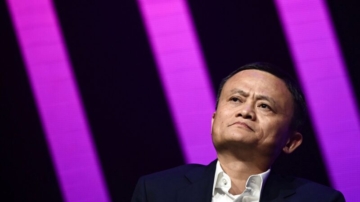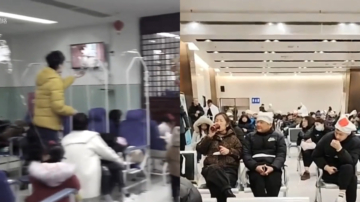【新唐人2014年07月17日讯】中共当局对中国新闻记者下发一系列禁令之后,日前,广电总局再对商业网站的所有境外影视剧下发禁令,要求必须在一周内下线,同时中宣部也被曝出,要求境外社交网路服务软件必须马上下架。评论斥责中共愚蠢到在互联网时代要“闭关锁国”。
中共新闻出版广电总局,日前分别约见包括《央视》、《央广》等七家互联网电视牌照商,要求他们必须在一周内,下线所有从境外引进的影视剧、微电影等,等待总局核查。
据报导,总局最晚将在7月21号开始检查,整改不到位的由总局出面处理,哪家不按总局要求做,就收回牌照,如果七家都违规,就暂停互联网电视业务。
原《河北人民广播电台》编辑朱欣欣认为,这都是中共专制统治合法性出现危机的表现,它怕境外剧占领中国市场,那些宣传洗脑作品则失去市场。
原《河北人民广播电台》编辑朱欣欣:“因为国外的,别看这些娱乐性的或者微电影啊一些作品,其实里面背后都有一些先进的理念,自由、民主的理念在做支撑,中共害怕人们从这里面不知不觉会受到熏陶,受到感染。”
朱欣欣表示,中共就是把境外剧全部封杀,它的节目仍然不会有人看,而这种愚蠢的作法,只能让人们见证它的落后和专制。
原《陕西电视台》记者马晓明:“中共现在已经倒退到了毛泽东时代了,封闭民主社会和自由社会的文化,要让它们所谓的专制,一党独裁、一党专制的这种文化,牢牢的统治所有的文化和新闻出版领域,对人民实行这种愚民政策,进行所谓爱它们这个党,爱国的这种所谓的教育。”
7月上旬,中共封锁了几个境外社交应用软件(Line、Flickr、KakaoTalk、OneDrive),7月10号,“脸书”(Facebook)旗下的图片分享软件“Instagram”也从大陆“安卓”应用商店消失。
有网友曝光中宣部下发的禁令﹕要求境外社交网路服务软件必须马上下架。网友纷纷斥责:中共当局愚蠢到妄图在互联网时代“闭关锁国”。
江苏南京资料库工程师章浩奇:“这也是情理之中,它在屏蔽之中这样的事会越来越多,因为从互联网下手是它们的第一要务,技术上它们能做,但是,我相信应该搞不定的,总会有替代的方式可以用。”
而朱欣欣表示,互联网时代,中共再多禁令,也无法阻止中国民众利用翻墙软件,到海外网站获取更多的资讯。
中共在不断加强网路监控的同时,对新闻记者也发出一系列禁令。如,6月,广电总局发文,禁止记者“私自展开批评报导”;7月8号,再发文禁止记者记录、传递所谓的“国家机密”,以及给境外媒体撰稿。
7月15号开始,约有25万名中国记者,被中共要求与所在新闻单位签署所谓“保密承诺书”,和“职务行为信息保密协议”。
马晓明表示,新闻记者从正式渠道采访到的消息,不存在保密不保密的问题。
马晓明:“中共它现在所说的保密,实际就是说的,它所封锁的大量的消息。这对公民的知情权,对记者的采访权是一个非常严重的侵犯,是对中共所要封闭和隐瞒、封锁的消息所采取的一种措施。”
马晓明指出,中共近期采取的一系列措施,就是要完善它对中国民众的思想封锁、新闻封锁和文化封锁。
采访编辑/李韵 后制/葛雷
China Bans Foreign Dramas and Software
The Chinese Communist Party (CCP) has issued
more restrictions to the Chinese media.
All foreign dramas on commercial websites
are being ordered to go offline within a week.
The Central Propaganda Department is also reported
to have shelved software from foreign social networks.
The series of acts have caused public to condemn the CCP's
policy of isolating China in today's information age.
The CCP's top media regulator has demanded 7 Internet TV
license providers such as China Central TV
and China National Radio to withdraw all foreign dramas,
short films, and so on, for the administration's investigation.
It's reported that any violation after July 21 at the latest
will be subject to punishment of a revoked license.
If all 7 providers failed to meet the requirement,
Internet TV services will be halted.
Former Hebei People's Radio editor Zhu Xinxin
says this represents the crisis of the CCP.
Its failure to maintain its regime's legitimacy makes it worry
that foreign films may occupy the Chinese market
and the CCP's brainwashing media may lose the market.
Zhu Xinxin: "Those foreign entertainment things or short
movies contain progressive ideas, like freedom and liberty.
The CCP fears these things might seep into and influence
people's minds."
Zhu Xinxin says that even if the CCP banned all foreign
dramas, people still wouldn't want to watch its programs.
Zhu says these foolish actions will only have people witness
the CCP's backwardness and tyranny.
Ma Xiaoming, former Shaanxi TV reporter: "The CCP has
stepped back to the Mao era, when the culture
from democratic societies and free societies was blocked.
The culture of the one-party rule or one-party dictatorship
is firmly governing all cultural and news publishing.
It's done to enforce ignorance in the people, and indoctrinate
them with flag-waving so-called love for the party."
In early July, the CCP blocked several foreign social media
software, such as Line, Flickr, KakaoTalk, and OneDrive.
On July 10, Facebook's photo sharing software, Instagram,
also vanished from Android software stores in China.
Netizens exposed the ban issued by the Central Propaganda
Department: All foreign social networking services software
must immediately be removed.
Netizens rebuked, "CCP authorities are trying to close off
the country in the information age."
Zhang Haoqi, database engineer in Nanjing city, Jiangsu:
"It makes sense. Things like this will happen more.
To block information, the Internet is their priority.
Technically, they can do it. But, I don't think it will work.
People will always have alternatives."
Zhu Xinxin says that in the information age, the CCP's many
new bans can't stop people from using software to overcome
internet censorship and get information from overseas websites.
While the CCP continues to strengthen its monitoring
of the Internet, a series of restrictions placed on journalists
has also been seen.
For example, in June, reporters were ordered not to conduct
critiques and commentary without approval;
On July 8, reporters were again forbidden to record or pass on
‘state secrets’ or serve as correspondents for foreign media.
Beginning on July 15, about 250,000 Chinese reporters were
demanded to sign the confidentiality agreement form
and the task and behavior confidentiality form.
Ma Xiaoming says that the issue of confidentiality should not
exist for information obtained through official channels.
Ma Xiaoming: "The so-called confidentiality is frankly
about all information the CCP covers up.
It's a serious violation of the people's right to know the truth
and the reporter's right to interview.
It's a measure of the CCP to hide and block information."
Ma Xiaoming says that the CCP manipulates these measures
to ensure its blockade of ideology, news, and culture.
Interview & Edit/LiYun Post-Production/GeLei
中共新闻出版广电总局,日前分别约见包括《央视》、《央广》等七家互联网电视牌照商,要求他们必须在一周内,下线所有从境外引进的影视剧、微电影等,等待总局核查。
据报导,总局最晚将在7月21号开始检查,整改不到位的由总局出面处理,哪家不按总局要求做,就收回牌照,如果七家都违规,就暂停互联网电视业务。
原《河北人民广播电台》编辑朱欣欣认为,这都是中共专制统治合法性出现危机的表现,它怕境外剧占领中国市场,那些宣传洗脑作品则失去市场。
原《河北人民广播电台》编辑朱欣欣:“因为国外的,别看这些娱乐性的或者微电影啊一些作品,其实里面背后都有一些先进的理念,自由、民主的理念在做支撑,中共害怕人们从这里面不知不觉会受到熏陶,受到感染。”
朱欣欣表示,中共就是把境外剧全部封杀,它的节目仍然不会有人看,而这种愚蠢的作法,只能让人们见证它的落后和专制。
原《陕西电视台》记者马晓明:“中共现在已经倒退到了毛泽东时代了,封闭民主社会和自由社会的文化,要让它们所谓的专制,一党独裁、一党专制的这种文化,牢牢的统治所有的文化和新闻出版领域,对人民实行这种愚民政策,进行所谓爱它们这个党,爱国的这种所谓的教育。”
7月上旬,中共封锁了几个境外社交应用软件(Line、Flickr、KakaoTalk、OneDrive),7月10号,“脸书”(Facebook)旗下的图片分享软件“Instagram”也从大陆“安卓”应用商店消失。
有网友曝光中宣部下发的禁令﹕要求境外社交网路服务软件必须马上下架。网友纷纷斥责:中共当局愚蠢到妄图在互联网时代“闭关锁国”。
江苏南京资料库工程师章浩奇:“这也是情理之中,它在屏蔽之中这样的事会越来越多,因为从互联网下手是它们的第一要务,技术上它们能做,但是,我相信应该搞不定的,总会有替代的方式可以用。”
而朱欣欣表示,互联网时代,中共再多禁令,也无法阻止中国民众利用翻墙软件,到海外网站获取更多的资讯。
中共在不断加强网路监控的同时,对新闻记者也发出一系列禁令。如,6月,广电总局发文,禁止记者“私自展开批评报导”;7月8号,再发文禁止记者记录、传递所谓的“国家机密”,以及给境外媒体撰稿。
7月15号开始,约有25万名中国记者,被中共要求与所在新闻单位签署所谓“保密承诺书”,和“职务行为信息保密协议”。
马晓明表示,新闻记者从正式渠道采访到的消息,不存在保密不保密的问题。
马晓明:“中共它现在所说的保密,实际就是说的,它所封锁的大量的消息。这对公民的知情权,对记者的采访权是一个非常严重的侵犯,是对中共所要封闭和隐瞒、封锁的消息所采取的一种措施。”
马晓明指出,中共近期采取的一系列措施,就是要完善它对中国民众的思想封锁、新闻封锁和文化封锁。
采访编辑/李韵 后制/葛雷
China Bans Foreign Dramas and Software
The Chinese Communist Party (CCP) has issued
more restrictions to the Chinese media.
All foreign dramas on commercial websites
are being ordered to go offline within a week.
The Central Propaganda Department is also reported
to have shelved software from foreign social networks.
The series of acts have caused public to condemn the CCP's
policy of isolating China in today's information age.
The CCP's top media regulator has demanded 7 Internet TV
license providers such as China Central TV
and China National Radio to withdraw all foreign dramas,
short films, and so on, for the administration's investigation.
It's reported that any violation after July 21 at the latest
will be subject to punishment of a revoked license.
If all 7 providers failed to meet the requirement,
Internet TV services will be halted.
Former Hebei People's Radio editor Zhu Xinxin
says this represents the crisis of the CCP.
Its failure to maintain its regime's legitimacy makes it worry
that foreign films may occupy the Chinese market
and the CCP's brainwashing media may lose the market.
Zhu Xinxin: "Those foreign entertainment things or short
movies contain progressive ideas, like freedom and liberty.
The CCP fears these things might seep into and influence
people's minds."
Zhu Xinxin says that even if the CCP banned all foreign
dramas, people still wouldn't want to watch its programs.
Zhu says these foolish actions will only have people witness
the CCP's backwardness and tyranny.
Ma Xiaoming, former Shaanxi TV reporter: "The CCP has
stepped back to the Mao era, when the culture
from democratic societies and free societies was blocked.
The culture of the one-party rule or one-party dictatorship
is firmly governing all cultural and news publishing.
It's done to enforce ignorance in the people, and indoctrinate
them with flag-waving so-called love for the party."
In early July, the CCP blocked several foreign social media
software, such as Line, Flickr, KakaoTalk, and OneDrive.
On July 10, Facebook's photo sharing software, Instagram,
also vanished from Android software stores in China.
Netizens exposed the ban issued by the Central Propaganda
Department: All foreign social networking services software
must immediately be removed.
Netizens rebuked, "CCP authorities are trying to close off
the country in the information age."
Zhang Haoqi, database engineer in Nanjing city, Jiangsu:
"It makes sense. Things like this will happen more.
To block information, the Internet is their priority.
Technically, they can do it. But, I don't think it will work.
People will always have alternatives."
Zhu Xinxin says that in the information age, the CCP's many
new bans can't stop people from using software to overcome
internet censorship and get information from overseas websites.
While the CCP continues to strengthen its monitoring
of the Internet, a series of restrictions placed on journalists
has also been seen.
For example, in June, reporters were ordered not to conduct
critiques and commentary without approval;
On July 8, reporters were again forbidden to record or pass on
‘state secrets’ or serve as correspondents for foreign media.
Beginning on July 15, about 250,000 Chinese reporters were
demanded to sign the confidentiality agreement form
and the task and behavior confidentiality form.
Ma Xiaoming says that the issue of confidentiality should not
exist for information obtained through official channels.
Ma Xiaoming: "The so-called confidentiality is frankly
about all information the CCP covers up.
It's a serious violation of the people's right to know the truth
and the reporter's right to interview.
It's a measure of the CCP to hide and block information."
Ma Xiaoming says that the CCP manipulates these measures
to ensure its blockade of ideology, news, and culture.
Interview & Edit/LiYun Post-Production/GeLei

